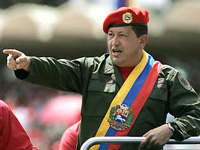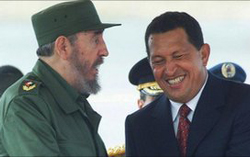redo Jump to...
print Print...
 (by Guy Taylor, Washington Times) – Venezuelan President Hugo Chavez, who led a socialist revolution in the heart of Latin America and garnered global notoriety for allying with Iran and railing angrily and often against the United States, died Tuesday after losing his battle against cancer. He was 58.
(by Guy Taylor, Washington Times) – Venezuelan President Hugo Chavez, who led a socialist revolution in the heart of Latin America and garnered global notoriety for allying with Iran and railing angrily and often against the United States, died Tuesday after losing his battle against cancer. He was 58.
Mr. Chavez traveled to Cuba in December for a cancer operation only two months after he won a third term as president. He underwent his first cancer surgery in Cuba in June 2011.
Vice President Nicolas Maduro is expected to assume the presidency of the oil-rich South American nation.
Reviled as a dictator by…free-market advocates and pro-democracy activists around the world, Mr. Chavez was regarded widely by scholars as one the most polarizing political figures the Western Hemisphere has seen in a generation.
He often was compared to China’s Mao Zedong and other communist revolutionaries, having built a cult of personality with followers – the “Chavistas” – hailing him as a political saint and champion of the poor.
A close friend and understudy of Communist Cuban leader Fidel Castro, Mr. Chavez also has been compared to Che Guevara, the militant Marxist who helped Mr. Castro rise during the 1950s and sparked communist fervor across South America until CIA-trained soldiers assassinated him in 1967.
Mr. Chavez rose to power during the 1990s, when Venezuela plunged into economic crisis because of plummeting world oil prices combined with rampant corruption in the government of President Carlos Andres Perez.
Boosted by a failed coup
In the wake of violent anti-capitalist street demonstrations, Mr. Chavez, then a lieutenant colonel in the Venezuelan army, attempted to lead a socialist military coup. When the coup failed, Perez’s government allowed Mr. Chavez, a previously unknown figure, to appear on national television to publicly surrender and avoid further bloodshed.
The result was a minute-long televised statement in which Mr. Chavez told viewers: “I, alone, shoulder the responsibility for this Bolivarian military uprising.”
The moment immortalized Mr. Chavez for supporters, who were impressed that he took responsibility for the failed coup in a break from the tradition of corrupt Venezuelan leaders who never accepted blame for their failures. The story of Mr. Chavez’s failed coup and his television appearance soon became the lore of a socialist movement in the nation.
Mr. Chavez was swept into the presidency by popular election in 1998 and held on to power [from that time]. Once in office, he moved swiftly to draft a new constitution and rename the country the “Bolivarian Republic of Venezuela” to honor Simon Bolivar, the revolutionary who led Venezuela to independence from Spain in 1821.
The move worried Mr. Chavez’s opponents, many of whom had their private land seized by the government. Mr. Chavez’s office also expropriated (took away ownership of) all private oil interests in Venezuela and began channeling a portion of its profits into social programs.
Free basic health clinics, high school diploma programs and food banks began popping up in poor neighborhoods across the nation. The programs were immediate hits in a country where half of the 25 million citizens were living below the poverty line.
Democracy advocates soon became wary that Mr. Chavez also was moving to centralize and drive the political opposition from the government, as well as stack the country’s highest courts with his supporters. …
Mr. Chavez faced growing opposition in 2002, when masses of demonstrators took to the streets to protest his policies. Anti-Chavez military officers mounted a coup on April 11 that forced him from office, but the junta soon collapsed amid strong pro-Chavez demonstrations and he was back in office three days later.
Throughout his reign, Mr. Chavez dominated Venezuelan state media with his presence. In addition to appearing almost daily for lengthy stretches on state TV, he would speak for hours from towns across Venezuela in a weekly television broadcast called “Hello President.”
He drew the wrath of Washington by building alliances with anti-American regimes in Cuba and Iran. He supplied Cuba with 100,000 barrels of oil a day and allowed Iran to mine for uranium to help its suspected nuclear-weapons program. Mr. Chavez also supported leftist leaders such as Evo Morales in Bolivia and Rafael Correa in Ecuador.
Popular among U.S. liberals
Mr. Chavez’s oil-fueled socialism won him a quiet fan base among many liberals in the United States. He worked with Joseph Kennedy, the eldest son of Robert F. Kennedy, on a program funded by Venezuela’s state-controlled oil monopoly to dole out free heating fuel to poor and elderly Americans.
However, Mr. Chavez’s Castro-like speeches condemning “U.S. imperialism” garnered the most attention in the English-language media, and conservatives regarded him as a virulently anti-American dictator.
Mr. Chavez’s antipathy toward the United States appeared to reach its high point in September 2006, when he addressed the U.N. General Assembly and called President Bush “the devil” bent on preserving “domination, exploitation and pillage of the people’s of the world.”
What most observers missed was the effectiveness with which such histrionics served to boost Mr. Chavez’s popularity in Venezuela, where he spent years crafting a careful narrative in which he existed as the hero, standing up to a mythical bully in the neighborhood.
During Venezuela’s 2006 election campaign, mountains ringing the capital city of Caracas were saturated with political signs that read: “Vote Against The Devil. Vote Against Imperialism. Vote for Chavez.”
Mr. Chavez was a master of tapping into the subculture of his supporters in vast low-income neighborhoods peppering those mountains. For years, he maintained a personal troupe of hip-hop performers, whose songs filled the air for hours at pro-Chavez rallies.
Mr. Chavez, surrounded by scantily clad women dancing to the beat, eventually would appear atop a tall flatbed truck working its way slowly through the beer-soaked crowds. A favorite pastime at such rallies — and one that likely will play out as his supporters mourn — involved a street theater rendition of a Venezuelan folk tale known as “Florentino and the Devil.”
The story follows Florentino, a young man who challenges the devil to a nighttime duel of singing. In the end, Florentino wins by singing until dawn because the devil has to flee the sunlight.
Copyright 2013 The Washington Times, LLC. Reprinted from the Washington Times for educational purposes only.
Questions
1. How was Venezuelan President Hugo Chavez viewed by scholars?
2. a) Who were Chavez’s supporters?
b) Why did they like him?
3. a) Who were President Chavez’s detractors/opponents?
b) For what reasons did they disapprove of his presidency?
4. What type of relations did President Chavez have:
a) With the U.S.?
b) With nations hostile to the U.S.?
5. How did Chavez portray himself? What image did he like to portray?
Background
For most of the first half of the 20th century, Venezuela was ruled by generally benevolent military strongmen, who promoted the oil industry and allowed for some social reforms. Democratically elected governments have [ruled] since 1959. Hugo Chavez, president since 1999, has promoted a controversial policy of “democratic socialism,” which [aims] to alleviate social ills while at the same time attacking globalization and undermining regional stability.(From the CIA World FactBook.)
Under the presidency of Hugo Chávez Venezuela has seen sweeping and radical shifts in social policy, moving away from the government officially embracing a free market economy and towards quasi-socialist income redistribution and social welfare programs. (from wikipedia)
HUGO CHAVEZ:
A gifted, charismatic orator with a keen ability to connect with the poor masses, Mr. Chavez was able to marshal public backing for a series of referendums that created a new constitution and permitted him to bring every important institution – from the legislature to the state oil company – under his control.
He criticized the U.S.-led invasions of Iraq and Afghanistan and, in a speech at the United Nations in 2006, said President George W. Bush was “the devil.” He called Tony Blair, then Britain’s prime minister, “an imperialist pawn who attempts to curry favor” with the Americans. He accused Israel of genocide, saying its treatment of the Palestinian people was akin to a “new Holocaust.”
Mr. Chavez sought out relationships with assorted rebel groups, rogues and pariah governments. He exchanged letters with Ilich Ramirez Sanchez, a Venezuelan-born terrorist known as Carlos the Jackal, who was held in a French prison. He asserted that Moammar Gaddafi’s Libya was a model of participatory democracy.
Closer to home, Mr. Chavez expressed affinity for the Revolutionary Armed Forces of Colombia, or FARC, a potent guerrilla group fighting Colombia’s U.S.-friendly government. His closest aides built a close relationship with FARC commanders, according to Colombian officials, rebel documents seized in army raids and former rebels.
He began neighborhood “missions” that offered literacy training in poor areas, posted doctors in crowded slums and opened state-operated markets offering subsidized food. The government claimed that under Mr. Chavez, poverty in Venezuela was reduced to 30 percent of the population from more than half when he took office.
The president also advanced on what he called 21st-century socialism, which included the nationalization of hundreds of companies, the seizure of large land holdings, price controls and currency regulations. In speeches blaming capitalism for society’s ills, Mr. Chavez said his policies had made Venezuela a more prosperous country, independent of U.S. meddling and influence.
But throughout his presidency, Venezuela’s economy was plagued by blackouts, food shortages and a lack of investment, as government interventions, from price controls to the seizures of land and companies, squelched private enterprise.
Though his government was blessed by historically high oil prices, with a barrel hitting $150 in 2008, the economy in Venezuela expanded by about 3 percent a year through his presidency, while much of Latin America boomed. (from washingtonpost.com)
Resources
In June 2012, Hugo Chavez banned private ownership of guns in Venezuela. Read a commentary here.
Daily “Answers” emails are provided for Daily News Articles, Tuesday’s World Events and Friday’s News Quiz.




